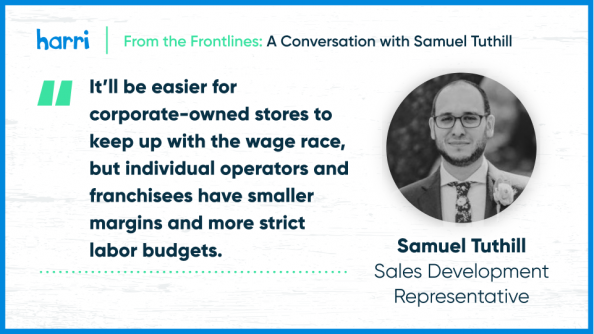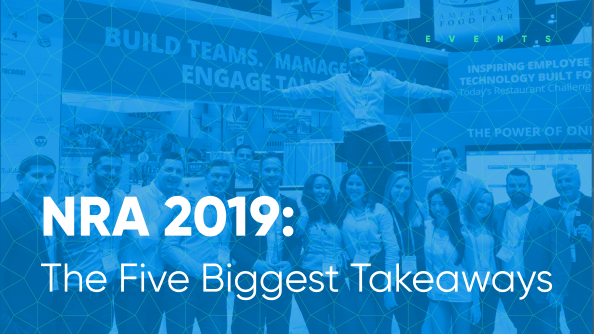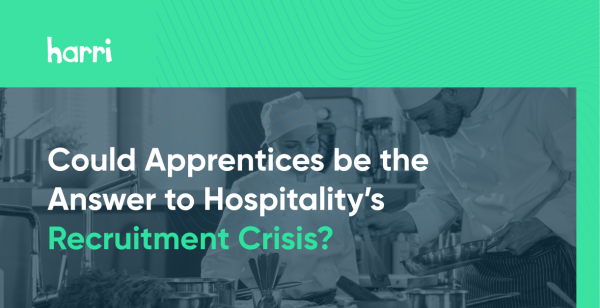How Jersey Mike’s Navigates California Labor Laws with Effective Workforce Management
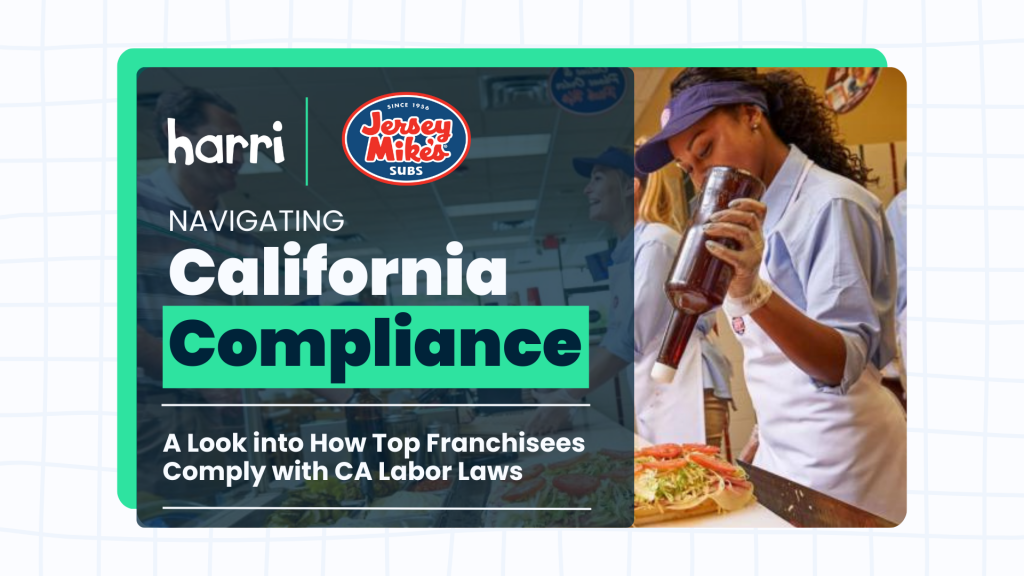
- By Harri Insider Team | August 29, 2024
In addition to being known for its sunny beaches and tech innovation, the state of California also a powerful trendsetter in labor legislation.
As one of the most stringent regulatory environments in the country, California’s labor laws often serve as a blueprint for other states. From minimum wage hikes to comprehensive break and overtime rules, the regulations that start in the Golden State frequently ripple across the nation, forcing businesses everywhere to adapt. For operators in the hospitality industry, particularly those with a national footprint, understanding and preparing for California’s labor laws is often a glimpse into the future of compliance nationwide.
Jersey Mike’s operators have gone beyond merely complying with California labor laws. They’ve used these regulations as an opportunity to refine their operations and improve efficiency. By integrating advanced workforce management tools, they are setting a new standard for compliance that not only meets legal requirements but also enhances performance. Their approach provides practical insights for operators across the country, demonstrating how compliance can be a catalyst for operational improvement.
Jersey Mike’s Strategy for Navigating California Labor Laws
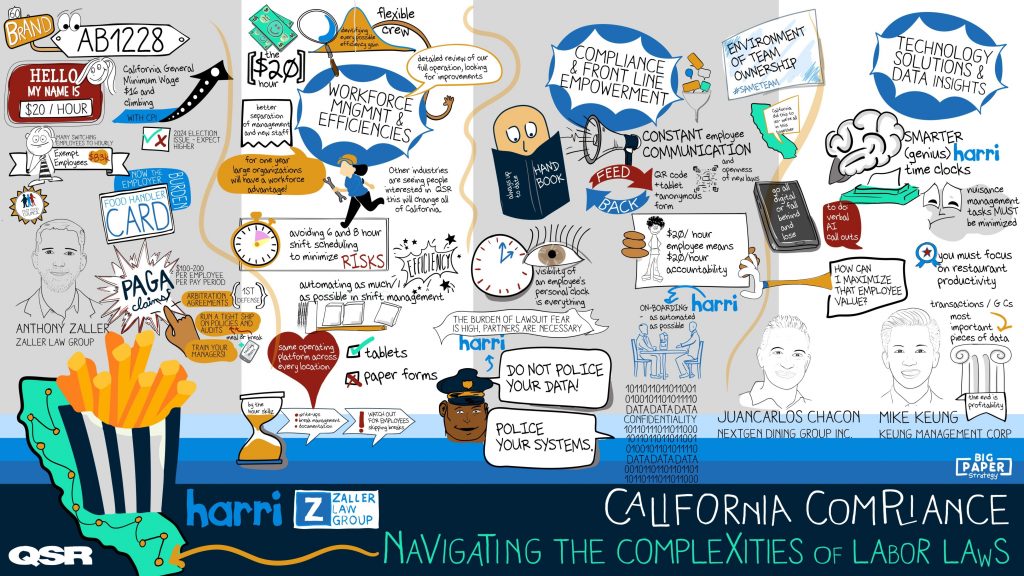
Juancarlos Chacon, President of NextGen Dining Group, operates Jersey Mike’s Subs locations in Los Angeles and Las Vegas, Nevada. When faced with increasing minimum wage and stringent labor laws in California, Chacon knew he had to take proactive steps to ensure his business remained compliant and profitable.
“We started preparing for this last year…we basically had to roll up our sleeves and dissect every segment of our operations internally and figure out the inefficiencies,” he explained during an online panel hosted by QSR Magazine.
To tackle these challenges, he broke down his operations into six key segments: morning, pre-lunch, lunch, post-lunch, dinner, and closing. By analyzing each segment individually, he identified where adjustments could be made without compromising service quality.
“We figured out where we can cut and be more efficient labor-wise, but we never touched the core bread and butter of our business…we would never try to circumvent service in that part of our business,” he emphasizes.
Maintaining high standards during peak times, particularly lunch, was crucial. While efficiency was important, the quality of service could not be sacrificed.
“We have to hold our people more accountable and demand excellence and flawless execution,” he says, highlighting Jersey Mike’s commitment to maintaining service excellence even as operational changes were implemented.
Automation and Operational Efficiency in Restaurant Compliance
To further streamline operations and ensure consistency across his multiple locations, Jersey Mike’s turned to automation.
“I took an approach as an owner of what I could do to automate the whole system…I’m in growth mode where I’m constantly building new stores every year and need to be able to have, as I scale, a plug and play mentality,” Chacon explains. By adopting a digital platform, they were able to simplify operations, making it easier to scale while remaining compliant with California labor laws.
This approach allowed them to maintain uniformity across stores, ensuring that each location operated with the same level of efficiency and adherence to regulations.
“As I scale, everybody’s operating the same way…So all my nine locations in LA are operating the same way and they’re basically protecting my organization and executing everything simultaneously. So I’m basically trying to operate if I have one store but I have multiple stores,” he notes.
This experience resonates with that of GR Waldrop, COO for Walcorp LLC, a franchisee of Jersey Mike’s Subs, who faced similar challenges across his 15 franchises.
Waldrop explains, “Before Harri, it was challenging for us as far as keeping track of scalable strategies on how we can watch our pennies in order to make the most out of our schedules. There are thousands of dollars that can be left on the table, just from the scheduling process. Our schedules were made with pen and paper. Our managers would transfer time punches from the POS by hand, write them down, and then send them to our office where we’d then manually input them into our payroll service. That’s an incredible amount of redundancy and manual work. All of this administrative tedium led us to the realization that we had to make a change.”
Effective Break and Hour Management for Restaurant Operators
A critical component of Jersey Mike’s strategy was implementing measures to accurately track employee hours and breaks, minimizing the risk of labor law violations. Chacon recognized the time-consuming nature of manually policing time sheets and sought a more efficient solution.
“To try to police those time sheets, it can be hours and hours a week…I needed to find a company that could actually do that for me and lo and behold I use Harri,” he says.
By utilizing Harri’s platform, Chacon automated time and attendance tracking, significantly reducing manual errors and ensuring compliance with California’s strict labor laws.
“We basically monitor to make sure that the reporting is correct so when I run my payroll it’s paying every single break violation every pay period,” he explains. This level of precision not only ensures compliance but also reduces the potential for costly labor law violations, providing peace of mind as his business continues to grow.
Integrating Compliance into Restaurant Operations
Jersey Mike’s strategy for handling California’s labor laws highlights the importance of making compliance an integral part of daily operations. By analyzing processes, adopting automation, and using tools like Harri, the company has successfully met regulatory requirements while enhancing the management of its restaurants.
For operators across the country, compliance can serve as an opportunity to refine operations and improve workforce management. By taking similar steps, operators can better navigate regulatory challenges and ensure their operations run smoothly.
How Harri’s Workforce Management Tools Simplify Compliance
Harri simplifies the complexities of staying compliant with ever-changing labor laws, by providing operators with a comprehensive workforce management platform that handles the intricacies of compliance.
Harri’s comprehensive workforce management platform automates key tasks such as tracking employee hours, managing breaks, and ensuring that labor laws are adhered to across all locations. This reduces the administrative burden on managers and minimizes the risk of violations. Additionally, Harri keeps pace with changing regulations, ensuring that the platform is always up-to-date with the latest labor laws, so operators can focus on running their restaurants without worrying about compliance gaps.
With Harri integrated into their operations, restaurant operators can effectively manage compliance while maintaining focus on the smooth running of their restaurants.
Looking for compliance resources? Check out our free state-by-state guide.












